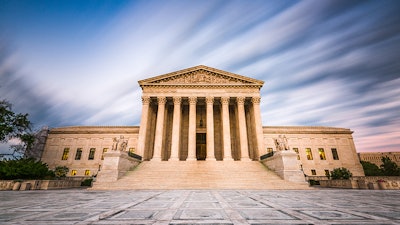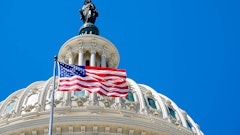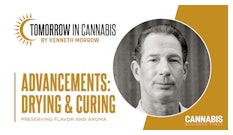
The U.S. Supreme Court ruled on April 2 that civil racketeering law does not bar a truck driver from recovering harms to his business or property that derive from a personal injury related to cannabis consumption.
The case, Medical Marijuana Inc. v. Horn, stems from truck driver Joshua Horn and his wife filing a lawsuit against the California-based cannabis company in 2015 after he was fired following a failed drug test that turned up a positive result for THC. Horn claimed the CBD product that he consumed, Dixie X, manufactured by Medical Marijuana, was advertised as containing 0% THC.
A commercial truck driver for 14 years, Horn claimed that consuming the product caused him to lose his job, current and future wages, and insurance and pension benefits. He argued that the Racketeer Influenced and Corrupt Organizations (RICO) Act should allow him to recoup the damages related to the injury of his “business or property.”
Meanwhile, Medical Marijuana argued in defense that personal injuries are not included under RICO law.
The Supreme Court justices ruled in favor of Horn in a 5-4 opinion on Wednesday, affirming an appellate decision that the phrase “injured in his business or property” does not preclude recovery for all economic harms that result from personal injuries.
Conservative Associate Justice Amy Coney Barrett authored the opinion, while liberal-leaning associate justices Sonia Sotomayor, Elena Kagan and Ketanji Brown Jackson joined, as did conservative Associate Justice Neil M. Gorsuch.
“We must decide whether the statute, by implicitly denying a remedy for personal injuries, also denies a remedy for business and property loss that derives from a personal injury,” Barrett wrote. “It does not.”
RELATED: 6 Cannabis Industry Legal Cases, Policy Reforms and Trends to Watch in 2025
According to Horn, he specifically sought a natural wellness medication as an alternative to prescription drugs to relieve his pain following hip and shoulder injuries he sustained in a February 2012 motor accident. Through a magazine advertisement later that year, Horn discovered a Dixie X CBD tincture that was advertised as THC-free, according to the lawsuit.
While CBD is the main nonintoxicating compound found in cannabis, THC is the main intoxicating compound. As a commercial truck driver, it was important to Horn to remain THC-free since heavy equipment operators are subject to random drug tests required by the U.S. Department of Transportation.
“Because a positive drug test could cost him his job, Horn was wary of any product that might contain THC,” Barrett wrote. “But Dixie X seemed safe. It was described as a ‘CBD-rich,’ nonpsychoactive medicine that is ‘0% THC.’ Medical Marijuana’s online FAQ page promised that Dixie X was ‘legal to consume both here in the U.S. and in many countries abroad.’ Additional research, including a call to a customer service representative, reinforced those representations. Satisfied that Dixie X was THC-free, Horn bought a bottle and gave it a try.”
After he subsequently failed a drug test, Horn refused to complete a substance-abuse program because, in his view, doing so would constitute “an admission to doing drugs,” according to the lawsuit.
His employer then fired him, and Horn sued Medical Marijuana in the U.S. District Court of the Western District of New York, which sided with the defense—that Horn’s injury was personal and did not apply to RICO law—and dismissed the lawsuit.
In 2023, the U.S. Court of Appeals for the Second Circuit reversed that decision, concluding that Horn had been “injured in his business” when he lost his job, an injury applicable to the federal racketeering law.
Under RICO claims, any person injured in his or her business or property “shall recover threefold the damages” he or she sustains, according to federal law. Horn could also recoup his attorney fees from Medical Marijuana if he can prove the cannabis company caused injury to his business or property.
While the majority of Supreme Court justices opined this week that Medical Marijuana cannot fend off Horn’s RICO claim through the personal injury defense, the dissenting opinion offered concern over setting a new precedent that potentially opens the scope of applying RICO claims for every economic loss—including an everyday slip or fall.
Associate Justice Brett M. Kavanaugh wrote the dissenting opinion in which Chief Justice John G. Roberts Jr. and Associate Justice Samuel A. Alito joined. Associate Justice Clarence Thomas wrote his own dissenting opinion.
Kavanaugh wrote that the term “injured” is a tort-law term of art and, therefore, “should be given its established common-law meaning,” writing that Congress did not pluck the word “injured” out of thin air when the RICO Act was enacted in 1970.
“The fundamental question here is whether business or property losses from a personal injury transform a traditional personal-injury suit into a business-injury or property-injury suit that can be brought in federal court for treble damages under RICO,” Kavanaugh wrote.
In opining that the answer to that question is no—RICO does not authorize claims for personal injuries, regardless of what losses or damages a plaintiff sustains from a personal injury—Kavanaugh sided with Medical Marijuana and stated that the Sixth, Seventh and Eleventh circuits back his dissenting viewpoint.
At the same time, the majority opinion granted certiorari on April 2 to resolve the appellate split, siding with the Second and Ninth circuits, which hold that business and property “are no less injured” simply because the plaintiff also suffered “an antecedent” personal injury.
However, the Supreme Court justices did not “express” a view on whether Horn suffered an antecedent personal injury when he consumed THC.
“In the courts below, Horn characterized his injury as exclusively to his business and property because the defendants hurt his livelihood, not his body,” Barrett wrote. “Whatever the merits of this theory, the Second Circuit did not address it, and neither party asks us to revisit the District Court’s conclusion that Horn suffered a personal injury. So, like the Second Circuit, we proceed on the understanding that he did.”
According to Kavanaugh, had Congress intended for personal injuries to apply to RICO, then it wouldn’t have excluded those suits when the federal law was enacted in 1970.
Initially, the RICO Act was intended to combat organized crime and racketeering by providing a tool to prosecute those who infiltrate legitimate organizations that operate in interstate commerce. However, the Supreme Court determined in 1981 that the term “enterprise,” as used in RICO, included both legitimate and illegitimate enterprises, resulting in RICO claims flooding the federal court system since.
Now, by opening RICO law as a remedy for business and property losses relating to personal injuries, Kavanaugh wrote that the majority opinion opened the doors further.
“The aftermath of the Court’s opinion could be quite a mess, as courts grapple with RICO personal-injury cases where the question is what losses qualify as business or property losses,” he wrote.
In October 2024, when the case was argued before the Supreme Court, Horn’s attorney, Easha Anand, argued that there are specific guardrails under RICO that prevent a lion’s share of recoveries in most tort cases from making claims under the federal racketeering law.
“In your average slip-and-fall case, you’re not going to be able to prove a predicate act, let alone a pattern of predicate acts, let alone a pattern carried on through a racketeering enterprise,” Anand said.
While the Supreme Court justices in the majority opinion acknowledged the concerns of the dissenting justices, they also pointed to RICO’s guardrails fencing out certain claims.
“Medical Marijuana, together with the principal dissent, warn that the Second Circuit’s rule will eviscerate RICO’s ‘business or property’ limitation,” Barrett wrote. “In their view, a plaintiff can characterize any economic harm flowing from a personal injury as a harm to his business or property. Hence, they say, plaintiffs can easily transform garden-variety personal-injury claims into RICO suits for treble damages. While we understand the concern, Medical Marijuana and the dissent understate other constraints on civil RICO claims.”
The majority pointed to:
- RICO’s direct-relationship requirement demands a “direct” link between the injury asserted and the injurious conduct alleged;
- Pleading a RICO claim is not as simple as pointing to a business or property harm. A plaintiff must first establish a pattern of racketeering activity; and
- The reach of federal civil remedies turns on more than the meaning of “injured.” “Business” may not encompass every aspect of employment, and “property” may not include every penny in the plaintiff’s pocketbook.
“All of this said, civil RICO has undeniably evolved ‘into something quite different from the original conception of its enactors,’” Barrett wrote. “More suits are brought against ordinary businesses than against ‘archetypal, intimidating mobster[s],’ and given this development, Medical Marijuana is not the first litigant to express concern about the ‘over-federalization’ of ‘traditional state-law claims.’ But we respond today as we have before: If the breadth of the statute ‘leads to the undue proliferation of RICO suits, the correction must lie with Congress.’”























